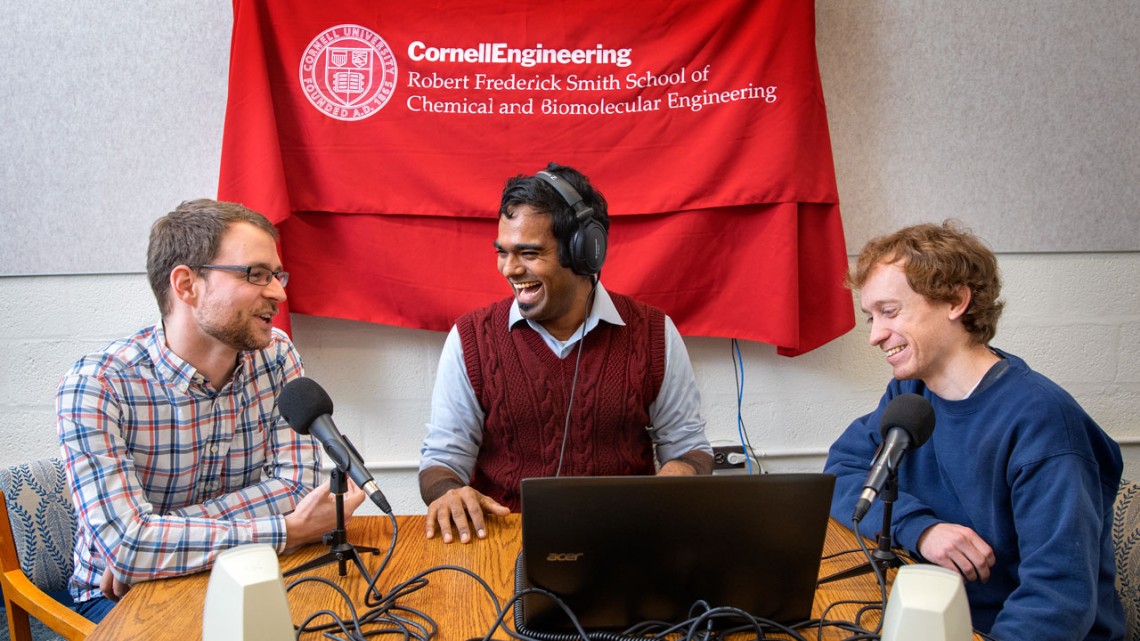
From left, Joseph Brown, Aravind Natarajan and Kevin Weyant, doctoral students in the Smith School of Chemical and Biomolecular Engineering, are co-founders of the Science Blender podcast. Brown and Weyant were executive producers of the podcast's first season; it was Natarajan's vision and proposal to the Smith Initiative that led to the podcast.
Podcast blends personal stories, accessible science
By Tom Fleischman
Scientists are people, too – and the graduate students producing a new Cornell-based podcast are working to spread that “news” to a worldwide audience via compelling stories about their research colleagues.
“Science Blender,” billed as a “podcast that blends a person with their science,” highlights a universal truth that often is forgotten: We are more than we appear to be, more than what we do.
Through storytelling modeled after such popular podcasts as “Radiolab” and “Planet Money,” each “Science Blender” episode introduces the listener to a current or former doctoral student in the Smith School of Chemical and Biomolecular Engineering (CBE), within Cornell Engineering.
The podcast, which debuted in July, is in the early stages of its second season and has already been downloaded in two dozen countries, including India, South Korea, Iran and Myanmar.
“Relating to scientists as being average people is really important, one, to increase trust in science. And two, every podcast tugs at a very important story about the person’s identity,” said Aravind Natarajan, doctoral student in microbiology in the lab of Matt DeLisa, the William L. Lewis Professor of Chemical and Biomolecular Engineering.
It was Natarajan’s vision – inspired by a chance roadside discussion with an activist in his native India – that led to the podcast, which received a grant through the Robert Frederick Smith Initiative. The initiative is funded with a portion of the $50 million gift Smith made to CBE and to Cornell Engineering in 2016.
Each episode is produced in Olin Hall, home of the Smith School, by team members who had no podcast or radio experience, using equipment purchased with grant funding.
Susan Daniel, associate professor of chemical and biomolecular engineering, and one of the podcast’s earliest supporters, is impressed with the students’ work.
“It exceeds my expectations,” said Daniel, one of three faculty advisers to the podcast, along with DeLisa and CBE director Abe Stroock. “Because they’re grad students, they understand and want to honor the person who’s at the center of the podcast and that person’s ability to talk about their life experiences as authentically as they can … It reminds you, ‘The person pipetting next to me is really a human, too,’ and that’s an important message to remember.”
The production team for season one included doctoral students Joseph Brown and Kevin Weyant.
“When Kevin and I read this proposal, we were like, ‘This could be very hard,’ because even the science communication podcasts that are out there don’t get a huge audience, and they get people who are already interested in science,” Brown said. “So if you’re trying to reach people who kind of care about science or are somewhat disinterested, you have to offer them a story.
“And if you do that,” he said, “you allow the listener to humanize the scientist and empathize with them and think, ‘I’ve had some experiences like that.’ And then they hear about the science, and it’s like, ‘Wow, that’s actually really cool.’”
The conversation with the activist in India got Natarajan thinking about science communication, along with the idea of promoting equity and diversity in STEM fields. He pitched his proposal in spring 2017, and production began in August of that year.
The first episode tells the story of Michael-Paul Robinson, Ph.D. ’18, a first-generation graduate student from Cleveland, Ohio, and how he was inspired to pursue a doctorate by a college professor who, like Robinson, was African-American. The 34-minute episode explores aspects of Robinson’s life unknown to his colleagues and friends.
“It’s crazy to think that in all that time I worked beside him, I knew almost nothing about the motivations that drove him to do the work that he did,” Weyant said in the podcast.
The podcast has been featured on the National Science Foundation’s Science360 Radio site, and was promoted on the NSF’s Twitter and Facebook accounts.
As the podcast enters season two, Brown, Natarajan and Weyant are hopeful that it will continue to grow and tell compelling stories.
“The thing is, we’ve got really great people and stories within our department,” Brown said. “The stories we have here are truly unique.”
Media Contact
Get Cornell news delivered right to your inbox.
Subscribe